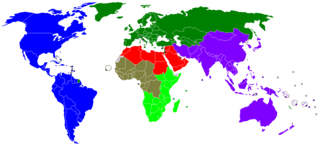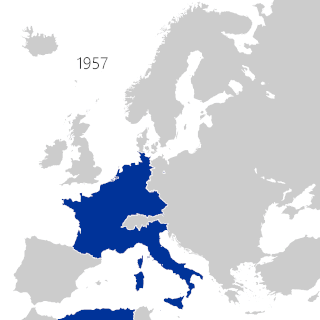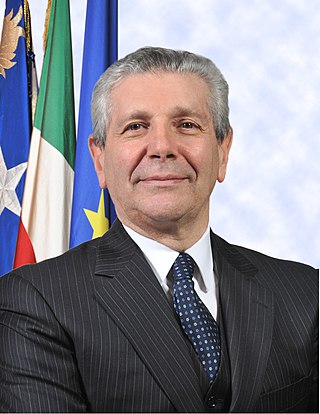
The Yugoslav Wars were a series of separate but related ethnic conflicts, wars of independence, and insurgencies that took place from 1991 to 2001 in what had been the Socialist Federal Republic of Yugoslavia. The conflicts both led up to and resulted from the breakup of Yugoslavia, which began in mid-1991, into six independent countries matching the six entities known as republics that had previously constituted Yugoslavia: Slovenia, Croatia, Bosnia and Herzegovina, Montenegro, Serbia, and Macedonia. SFR Yugoslavia's constituent republics declared independence due to unresolved tensions between ethnic minorities in the new countries, which fueled the wars. While most of the conflicts ended through peace accords that involved full international recognition of new states, they resulted in a massive number of deaths as well as severe economic damage to the region.

As of January 2023, the World Customs Organization has a total of 185 members. The European Communities joined "on an interim basis akin to those enjoyed by WCO Members".

The Western Bloc, also known as the Capitalist Bloc, is an informal, collective term for countries that were officially allied with the United States during the Cold War of 1947–1991. While the NATO member states, in Western Europe and Northern America, were pivotal to the bloc, it included many other countries, in the broader Asia-Pacific region, the Middle East, Latin America, and Africa with histories of anti-Soviet, anti-communist and, in some cases anti-socialist, ideologies and policies. As such, the bloc was opposed to the political systems and foreign policies of communist countries, which were centered on the Soviet Union, other members of the Warsaw Pact, and usually the People's Republic of China. The name "Western Bloc" emerged in response to and as the antithesis of its Communist counterpart, the Eastern Bloc. Throughout the Cold War, the governments and the Western media were more inclined to refer to themselves as the "Free World" or the "First World", whereas the Eastern bloc was often referred to as the "Communist World" or less commonly the "Second World".
An international decoration is a military award which is not bestowed by a particular country, but rather by an international organization such as the United Nations or NATO. Such awards are normally issued as service medals, for participation in various international military operations, and not for specific acts of heroism or bravery.

The Australian Active Service Medal (AASM) is an Australian military decoration. It was authorised on 13 September 1988 to recognise prescribed service in "warlike" operations, backdated to February 1975. It is awarded with a clasp to denote the prescribed operation and subsequent awards of the medal are made in the form of additional clasps. In 2012, it was announced that the medal would no longer be issued for future operations, with the AASM and the Australian Service Medal being replaced by the Australian Operational Service Medal.

The Norwegian military have been deployed in countries other than Norway many times, most of them during and after World War II. After 1947, Norway has participated in over 40 military operations abroad and over 120,000 Norwegian troops served in these operations. As of early 2006, 550 Norwegian troops were deployed abroad.
A mine clearance organization, or demining organization, is an organization involved in the removal of landmines and unexploded ordnance (UXO) for military, humanitarian, or commercial reasons. Demining includes mine clearance, as well as surveying, mapping and marking of hazardous areas.

The Danish Emergency Management Agency (DEMA) is a Danish governmental agency under the Ministry of Defence. Its principal task is to manage an operational part who work out of six Emergency Management Centres, and administrative and legalizing part, who supervises the national and municipal rescue preparedness and advises the authorities on matters of preparedness. DEMA works in closely structured co-operation with the EU, UN and several neighbouring countries.

Pax Europaea is the period of relative peace experienced by Europe following World War II, in which there were notably few international conflicts or wars between European states. This peace had often been associated with the creation of NATO, the European Union (EU), and the predecessor institutions of the EU including the European Economic Community. This era of relative peace has been broadly maintained following the end of the Cold War and the Dissolution of the Soviet Union, with the major exceptions of the Yugoslav Wars, The Troubles in Northern Ireland, and various tensions and wars involving or within Russia.

A naval ensign is an ensign used by naval ships of various countries to denote their nationality. It can be the same or different from a country's civil ensign or state ensign.
The foreign policy of the Bill Clinton administration was of secondary concern to a president fixed on domestic policy. Clinton relied chiefly on his two experienced Secretaries of State Warren Christopher (1993–1997) and Madeleine Albright (1997–2001), as well as Vice President Al Gore. The Cold War had ended and the Dissolution of the Soviet Union had taken place under his predecessor President George H. W. Bush, whom Clinton criticized for being too preoccupied with foreign affairs. The United States was the only remaining superpower, with a military strength far overshadowing the rest of the world. There were tensions with countries such as Iran and North Korea, but no visible threats. Clinton's main priority was always domestic affairs, especially economics. Foreign-policy was chiefly of interest to him in terms of promoting American trade. His administration signed more than 300 bilateral trade agreements. His emergencies had to do with humanitarian crises which raised the issue of American or NATO or United Nations interventions to protect civilians, or armed humanitarian intervention, as the result of civil war, state collapse, or oppressive governments.

The Humanitarian Overseas Service Medal is an award in the Australian honours system. The award is presented to those who perform humanitarian service in a foreign country, in particular those working in dangerous environments or conditions or during a humanitarian crisis. The award was introduced by letters patent on 16 April 1999, following a review of the Australian honours and awards system beginning in 1995.

Acted is a French international solidarity non-governmental organization (NGO), founded in 1993. It is headquartered in Paris.

Giampaolo Di Paola is an Italian naval officer who served in the government of Italy as minister of defense from November 2011 to April 2013. He was the Italian military's Chief of Staff from 10 March 2004 to 8 February 2008 and served as Chairman of the NATO Military Committee from 2008 to 2011.

Australian military involvement in peacekeeping operations has been diverse, and included participation in both United Nations sponsored missions, as well as those as part of ad hoc coalitions. Indeed, Australians have been involved in more conflicts as peacekeepers than as belligerents; however, according to Peter Londey "in comparative international terms, Australia has only been a moderately energetic peacekeeper." Although Australia has had peacekeepers in the field continuously for 60 years – the first occasion being in Indonesia in 1947, when Australians were among the first group of UN military observers – its commitments have generally been limited, consisting of small numbers of high-level and technical support troops or observers and police. David Horner has noted that the pattern changed with the deployment of 600 engineers to Namibia in 1989–90 as the Australian contribution to UNTAG. From the mid-1990s, Australia has been involved in a series of high-profile operations, deploying significantly large units of combat troops in support of a number of missions including those in Cambodia, Rwanda, Somalia and later in East Timor. Australia has been involved in close to 100 separate missions, involving more than 30,000 personnel and 11 Australians have died during these operations.
Journeyman Pictures Ltd is a film distribution company based in the United Kingdom. The company works as an independent sales agent for producers of short current affairs, broadcast and feature-length films, both non-fiction and fiction.












